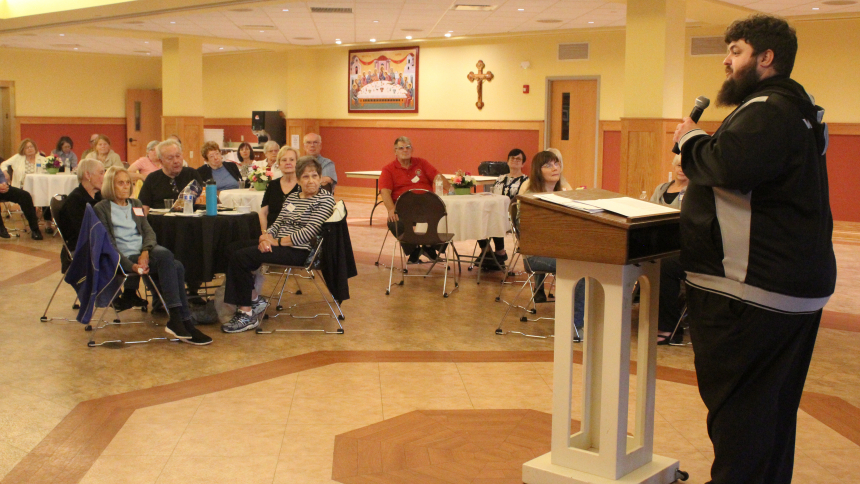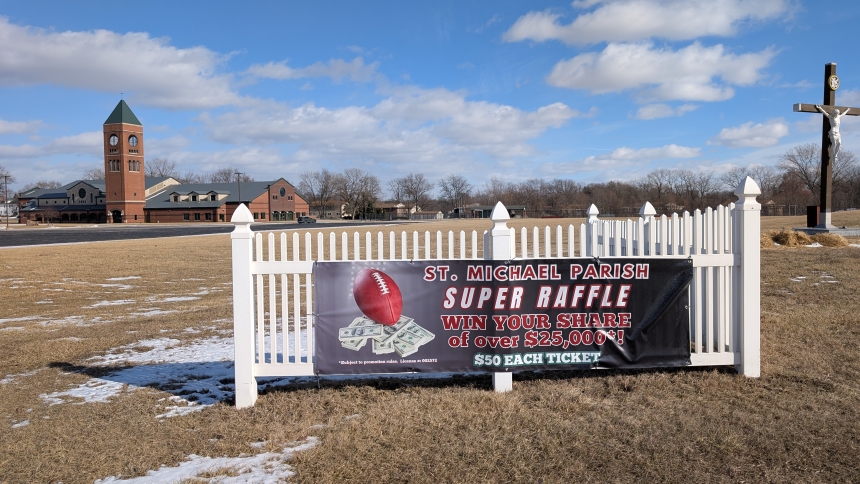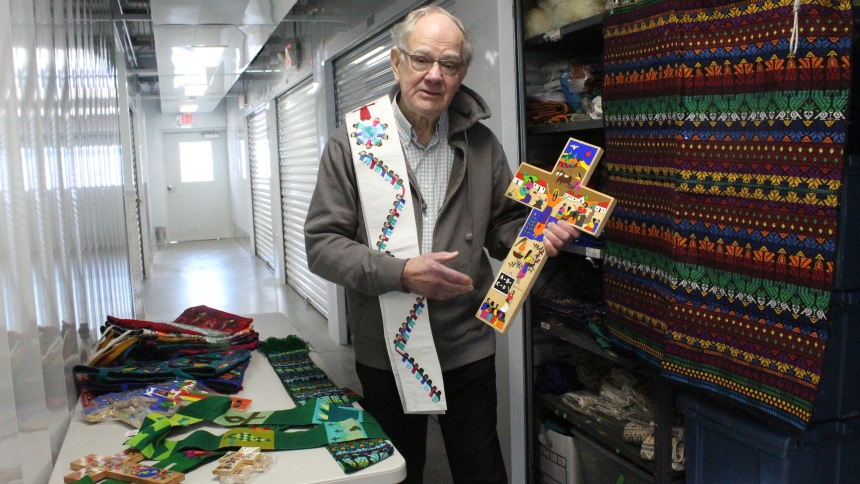
SCHERERVILLE – Praised as “The greatest of Jesus’ sermons,” the Beatitudes are “all so essential that we should know them all and live them,” Father Greg Bim-Merle suggested to an attentive Theology Uncorked audience on June 27 at St. Michael the Archangel.
Father Bim-Merle explained that he became a student of the Beatitudes last year when he was asked to serve as retreat leader for the Knights of Malta, Chicago Region. “They asked me to speak about the Beatitudes, and I found out they were the founding principles of the Order of Malta,” he said. “I decided I’d better really dig in and I found out some interesting things about the Beatitudes.
“I actually became shocked and enthused by this beautiful teaching of Jesus, part of the Sermon on the Mount, and since then I have talked about this topic every time I’ve been asked to speak to a group,” Father Bim-Merle admitted.
“We should want to follow the Beatitudes, because each one starts with ‘Blessed are…’ and ends with a reward,” he joked of the list often compared to the Ten Commandments as a blueprint for holiness.
Two of the best sources Father Bim-Merle found on the Beatitudes, he revealed, are St. Augustine and St. Leo the Great, both of whom he quoted in explaining each of the eight virtues:
Blessed are the poor in spirit, for theirs is the Kingdom of Heaven. “This sets the stage for all of the other graces God wants to give us,” said Father Bim-Merle. “It is written about more than any of the others. It is so fundamental that without it, the other Beatitudes wouldn’t make sense.
“St. Leo tells us that it’s not about riches, but about humility, and we have to make sure we are generous … and not too attached to material things.
“St. Augustine says we need to lighten our load – be generous – and we will be less burdened.”
Blessed are those who mourn, for they shall be comforted. “Does God want us all to have loss? St. Augustine says that ‘mourning’ in this Beatitude has a spiritual meaning, that we are dead in our sin and that sinfulness should bring about a mournfulness,” said Father Bim-Merle. “If we understand that explanation from St. Augustine, this Beatitude is so much more wonderful … we know God will comfort us.
“St. Leo said that religious grief mourns sin and the just man’s endurance leads us on to comfort and forgiveness.”
Blessed are the meek, for they shall inherit the land. “This just seems wrong, because in reality the meek don’t get the land,” noted Father Bim-Merle. “‘Meek,’ to us, has meant timid, scared, spineless and weak, and none of those seem like virtues. But ‘meek’ is misunderstood in our culture – what it really means is ‘The proper response to a given situation.’ A meek person is not weak or a pushover, but gives an appropriate response.
“St. Leo said ‘inherit the land’ is the promise of the resurrection.”
Blessed are those who hunger and thirst for righteousness, for they will be satisfied. “God wants us to be hungry and thirsty – for holiness, and while we may be quenched tonight, we are never holy enough (full); God wants to continually give us his love,” Father Bim-Merle explained.
“St. Leo and St. Augustine spoke of a constant hunger and thirst for (God’s love) during our entire lives.”
Blessed are the merciful, for they will be shown mercy. “If we want to receive God’s mercy, we need to be merciful,” Father Bim-Merle stressed. ‘St. Leo said, ‘Recognize, Christian, the worth of your wisdom. Mercy must be reflected in the mirror of the human heart.’”
Blessed are the clean of heart, for they will see God. “This Beatitude is written about the most, after the first. The first five show us what we need to do to be clean of heart – humble, repentant, meek, merciful and forgiving. They are a spiritual guidebook, leading us from one to another. This purity of heart is dependent on the first five virtues – plus faith in God.
“St. Augustine said, ‘Faith must be backed up by charity, lest we be like Satan, who had plenty of faith in God, just didn’t follow God.’”
Blessed are the peacemakers, for they shall be called the children of God. “Once we know who God is, that allows us to be peacemakers,” said Father Bim-Merle, “and not just with others, but be at peace with God. This is a more intimate mention of God, because we are now part of God’s family. It is very powerful.”
Blessed are those who are persecuted for the sake of righteousness, for theirs is the Kingdom of Heaven. “Now Jesus, after all the virtues, tells us it is good to be persecuted,” Father Bim-Merle said. “This is the only reward that is duplicated, but it is still connected to the poverty of spirit. St. Augustine calls to mind the two thieves that were hung on either side of Jesus. For one, ‘the cross is his destruction, and for the other, it is his salvation.’”
“The Beatitudes are God’s roadmap for us if we want the Kingdom of Heaven,” noted Father Bim-Merle. “Jesus didn’t ask us to do anything he hasn’t done.
“The life of Mary is (also) an example of how to live the Beatitudes; there’s a lot of connections to the Beatitudes in her ‘Magnificat,’” Father Bim-Merle said as he led the gathering in reciting Mary’s famous prayer.
Attendees found much to embrace in the priest’s message.
“I learned that being meek and humble is not being a doormat, but is a virtue,” said Eileen Germek, a St. Michael parishioner, while her sister, Mary Ellen Boyle, a parishioner at St. John the Baptist in Whiting, admitted, “I didn’t ever think about the Beatitudes in conjunction with the Ten Commandments.”
“You don’t have to pick one (Beatitude) to follow, said Phil Przybylinski, of St. Michael the Archangel. “You are supposed to follow them all.”
Bob Solario, also a St. Michael parishioner, said he had never considered the Beatitudes “at the same level as the Ten Commandments. My wife and I just watched the second season of ‘The Chosen,’ and saw Jesus’s Sermon on the Mount, so this talk had more meaning for me.”
Father Bim-Merle offered a short prayer for his audience. “Let’s ask the Lord to have us follow the words of Christ so we can see each other again in Heaven,” he concluded.



